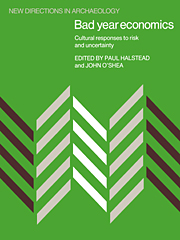Book contents
- Frontmatter
- Contents
- List of contributors
- List of figures
- List of tables
- Preface
- 1 Introduction: cultural responses to risk and uncertainty
- 2 The spirit of survival: cultural responses to resource variability in North Alaska
- 3 Saving it for later: storage by prehistoric hunter–gatherers in Europe
- 4 The role of wild resources in small-scale agricultural systems: tales from the Lakes and the Plains
- 5 The economy has a normal surplus: economic stability and social change among early farming communities of Thessaly, Greece
- 6 Changing responses to drought among the Wodaabe of Niger
- 7 Of grandfathers and grand theories: the hierarchised ordering of responses to hazard in a Greek rural community
- 8 Risk and the polis: the evolution of institutionalised responses to food supply problems in the ancient Greek state
- 9 Monitoring interannual variability: an example from the period of early state development in southwestern Iran
- 10 Public intervention in the food supply in pre-industrial Europe
- 11 Conclusion: bad year economics
- References
- Index
- ALSO IN THIS SERIES
1 - Introduction: cultural responses to risk and uncertainty
Published online by Cambridge University Press: 26 October 2009
- Frontmatter
- Contents
- List of contributors
- List of figures
- List of tables
- Preface
- 1 Introduction: cultural responses to risk and uncertainty
- 2 The spirit of survival: cultural responses to resource variability in North Alaska
- 3 Saving it for later: storage by prehistoric hunter–gatherers in Europe
- 4 The role of wild resources in small-scale agricultural systems: tales from the Lakes and the Plains
- 5 The economy has a normal surplus: economic stability and social change among early farming communities of Thessaly, Greece
- 6 Changing responses to drought among the Wodaabe of Niger
- 7 Of grandfathers and grand theories: the hierarchised ordering of responses to hazard in a Greek rural community
- 8 Risk and the polis: the evolution of institutionalised responses to food supply problems in the ancient Greek state
- 9 Monitoring interannual variability: an example from the period of early state development in southwestern Iran
- 10 Public intervention in the food supply in pre-industrial Europe
- 11 Conclusion: bad year economics
- References
- Index
- ALSO IN THIS SERIES
Summary
The world about us is in a constant state of flux. The nomad in the Kalahari Desert and the Western city-dweller in front of his television set are both repeatedly confronted by changes in their natural surroundings and in the behaviour of other members of their own species. In this respect, at least, their experience is no different from that of all other organisms.
Culture endows man with exceptional flexibility in coping with his surroundings and, in consequence, human beings regularly cope with an unusual diversity of natural and social environments. As a result, the normal lifestyle of people in different parts of the world can be radically different. Yet the inherent temporal instability of these environments still poses problems and unusually severe perturbations frequently claim human lives. Shortage of food, one of the most basic and yet least reliable of the requirements for human survival, remains a common cause of loss of life. The means by which human beings secure their food supply in the face of such uncertainty are thus as central to society as the consequences of shortage are drastic and they have far-reaching ramifications throughout cultural behaviour and social life.
Human communities have developed an impressive array of cultural mechanisms for buffering variability.
- Type
- Chapter
- Information
- Bad Year EconomicsCultural Responses to Risk and Uncertainty, pp. 1 - 7Publisher: Cambridge University PressPrint publication year: 1989
- 63
- Cited by



